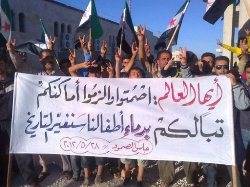Western countries have expelled Syrian diplomats after the United Nations said most of the victims of the massacre in Houla village were summarily executed without decisively saying who carried out most of the killings.
The United States, Germany, France, Britain, Italy, Australia, Canada, Spain, Belgium, Bulgaria and the Netherlands said on Tuesday they were protesting the massacre in Houla on Friday of at least 108 people.
In Damascus, after meeting with President Bashar al-Assad, international mediator Kofi Annan said Syria had reached a tipping point as his six-point peace plan was not being properly implemented.
The diplomatic pressure came as France talked of military intervention backed by the United Nations Security Council.
"It is not possible to allow Bashar al-Assad's regime to massacre its own people," French President Francois Hollande told France 2 television. "Military intervention is not excluded provided it is carried out under the auspices of international law, namely via a Security Council resolution."
"It is down to myself and others to convince Russia and China, and also to find a solution which is not necessarily a military one," said Hollande, who is due to meet Russian President Vladimir Putin in Paris on Friday.
Friday's killings in Houla, a collection of farming villages in Homs province that has become a focal point for opposition to Syrian President Bashar al-Assad, was one of the deadliest single events in the 15-month-old uprising against Assad that has killed thousands.
'Tipping point'
Kofi Annan has called the Houla killing "an appalling moment with profound consequences".
"The Syrian people do not want the future to be one of bloodshed and division. Yet the killings continue and the abuses are still with us today.
"I appealed to him [Assad] for bold steps now - not tomorrow, now - to create momentum for the implementation of the plan".
Annan, arrived in Syria a day earlier, and held meetings with UN observers and Walid al-Muallem, the Syrian foreign minister.
The success of Annan's peace plan depended on "the end of terrorism", Assad told him, state television reported.
Tuesday's meeting in Damascus came as the UN High Commissioner for Human Rights said that entire families had been shot in their homes and that fewer than 20 of the 108 Houla victims were killed by artillery.
Most of the victims, including children, were shot at close range, the UN human rights office said.
Rupert Colville, a spokesman for the body, said the conclusions were based on accounts gathered by UN monitors and corroborated by other sources.
'Summarily executed'
"Most of the ... victims were summarily executed in two separate incidents," Colville said in Geneva, Switzerland.
He said witnesses blamed armed pro-government forces, known as "shabiha", for the attacks. He noted that the shabiha sometimes acted "in concert" with government forces.
Activists have posted videos of tanks and armored vehicles in the middle of cities, a violation of Annan's six-point peace plan, and UN observers said they found spent tank and artillery shells in Houla after the massacre there.
PHOTO CAPTION
A handout image released by the Syrian opposition's Shaam News Network shows an anti-regime demonstration in Hass.
Al-Jazeera


 Home
Home Discover Islam
Discover Islam Quran Recitations
Quran Recitations Lectures
Lectures
 Fatwa
Fatwa Articles
Articles Fiqh
Fiqh E-Books
E-Books Boys & Girls
Boys & Girls  Hajj Rulings
Hajj Rulings Hajj Fatwas
Hajj Fatwas














